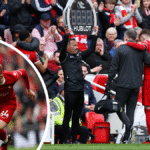I had to leave Chelsea to join Liverpool – what they told me blew me away

When Daniel Sturridge looks back on his football journey, there is always one chapter that shines brighter than the rest. It is the chapter where he left the shadows of Stamford Bridge to step into the light of Anfield. He was once a Chelsea player, full of talent, full of hunger, but left frustrated by the lack of chances, waiting and waiting for opportunities that never came. And then came Liverpool, with a message, a plan, a philosophy that changed everything. What they told him blew his mind, and it made him walk away from Chelsea and embrace a future that would turn him into one of the most loved strikers in Liverpool’s modern history.
The story begins in January 2013. Sturridge had already tasted success with Chelsea, lifting trophies, including the Champions League, but he never felt like he belonged. At Stamford Bridge, opportunities were scarce. Managers rotated, big-money signings arrived, and for Sturridge, who believed he had more to give, the waiting became unbearable. He was not the type to sit quietly on the bench and collect medals. He wanted the stage, the minutes, the responsibility. He wanted to play football not just for the name of a club, but for the joy of expressing his talent.
When Liverpool called, everything changed. For him, it was not just a transfer; it was a rebirth. Liverpool did not just say they wanted him; they showed him why. The club, under the ownership of Fenway Sports Group, had embraced a philosophy known as “Moneyball”—a data-driven approach to recruitment and performance. They sat Sturridge down and explained to him, not in vague promises, but in detailed statistics, why he was perfect for Liverpool. They told him things about his game that even he had never thought deeply about.
“They talked a lot about the statistics, the Moneyball type of thing,” Sturridge later revealed. “I think I was one of the first players, if not the first, that they’d signed with that in mind, which was all based on stats. Things such as conversion rates—they were like, ‘You don’t get many opportunities, but when you play, you score, and also this and this, and we’ve seen this other thing too.’ I was like, ‘This whole thing you’ve put up in front of me is blowing my mind a little bit.’ I really liked the way they were thinking.”
It was not just numbers; it was belief. For years, at Chelsea, the numbers did not matter because the eyes of the managers were always on other stars. At Liverpool, the statistics told a different story. They showed him that he was not just another striker. He was a weapon. He was efficient. He was clinical. He was a player who could turn chances into goals with frightening regularity. And for the first time in his career, a club looked at him not as a backup, not as an option, but as a central figure. That touched him in a way that words alone could not.
At that time, Brendan Rodgers was in charge at Liverpool. Rodgers was a coach with ideas, a man who loved attacking football, who wanted his teams to flow, to press, to entertain. For Sturridge, who had spent too long in rigid systems or on benches, this was refreshing. “The manager, Brendan Rodgers, was a forward-thinking, attacking, free-flowing coach as well, so it just made perfect sense, because I wasn’t playing every game prior to that,” he said. Rodgers wanted him to express himself, to combine his pace, movement, and finishing in a system built to attack. It was freedom, and freedom was exactly what he needed.
So, he left Chelsea. It wasn’t easy. Leaving a club that had just won the Champions League, leaving teammates, leaving London—it could have been seen as a step down by some. But for Sturridge, it was the opposite. It was a step towards the stage he deserved. “I’ve always been someone who isn’t content being at a big team simply to be there,” he explained. “I want to play. If that means leaving to play for somebody else, so be it. So, when Liverpool came, it was like, ‘This is an unbelievable football club and if they want me, I’m going.’”
And what a decision it turned out to be. From the moment he pulled on the red shirt, Sturridge transformed. His partnership with Luis Suarez became one of the deadliest duos the Premier League had ever seen. Together, they terrorized defenses, scoring goals from everywhere, linking with speed, intelligence, and flair. The 2013/14 season became legendary, a season where Liverpool came within touching distance of the Premier League title. Suarez may have taken most of the headlines, but Sturridge’s 21 goals in that campaign were the heartbeat of Liverpool’s charge.
Anfield fell in love with him—not just for the goals, but for the way he celebrated them. The trademark dance, the arms moving, the smile lighting up the stadium—it became a ritual, a connection with the fans, a symbol of joy. Daniel Sturridge wasn’t just scoring; he was entertaining. And in Liverpool, entertainment and passion are everything.
But as much as he soared, the story was also filled with pain. Injuries haunted him, time and again pulling him away from the pitch, forcing him to watch when he wanted to play, to sit when he wanted to run. The frustration was immense, not just for him but for the fans who adored him. Every comeback was greeted with hope, every setback with sadness. Yet even through it all, Sturridge left his mark.
By the time he departed Liverpool in 2019, he had scored 67 goals in 160 appearances, a strike rate that placed him among Anfield’s most clinical forwards. He lifted the Champions League with the Reds, a fitting reward for years of struggle and brilliance. Even though injuries cut short what could have been an even greater legacy, he walked away with his head held high, forever remembered for the magic moments he gave to the Kop.
Liverpool’s fans still talk about Sturridge with affection. His finishing was compared to legends like Robbie Fowler, his dancing remembered like a song that never fades. He was the striker who, for a time, made Liverpool believe again. And the decision he made back in 2013, the decision to leave Chelsea and trust Liverpool’s vision, remains one of the most important choices of his career.
The “Moneyball” approach that convinced him was not just about buying players on the cheap, as many misunderstood. It was about looking deeper, about using analysis to uncover hidden value. It was about seeing what others overlooked. For Liverpool, it worked. For Sturridge, it changed everything. It turned him from a player waiting in the wings to a star under the lights.
After leaving Liverpool, Sturridge’s journey took him to West Brom, then to Turkey with Trabzonspor, then all the way to Australia with Perth Glory. None of those chapters ever reached the heights of Anfield, but perhaps they were never meant to. Liverpool was the place where he truly belonged, the place where his talent was fully appreciated, the place where he danced and the crowd danced with him.
Now, at 36, as he reflects on his career, the memories are clear. The goals, the celebrations, the near-title, the Champions League medal—they are all part of the story. But so too is the conversation that blew him away back in 2013, when Liverpool showed him who he truly was through the lens of statistics, analysis, and belief. That was the spark that lit the fire. That was the beginning of everything.
And as Liverpool prepare to face Chelsea again, the echoes of that decision return. It is a reminder that football is not just about money, not just about trophies, but about choices, about belief, about moments when a player finds the right club at the right time. Daniel Sturridge found his in Liverpool. And Liverpool, for a few glorious years, found theirs in him.















